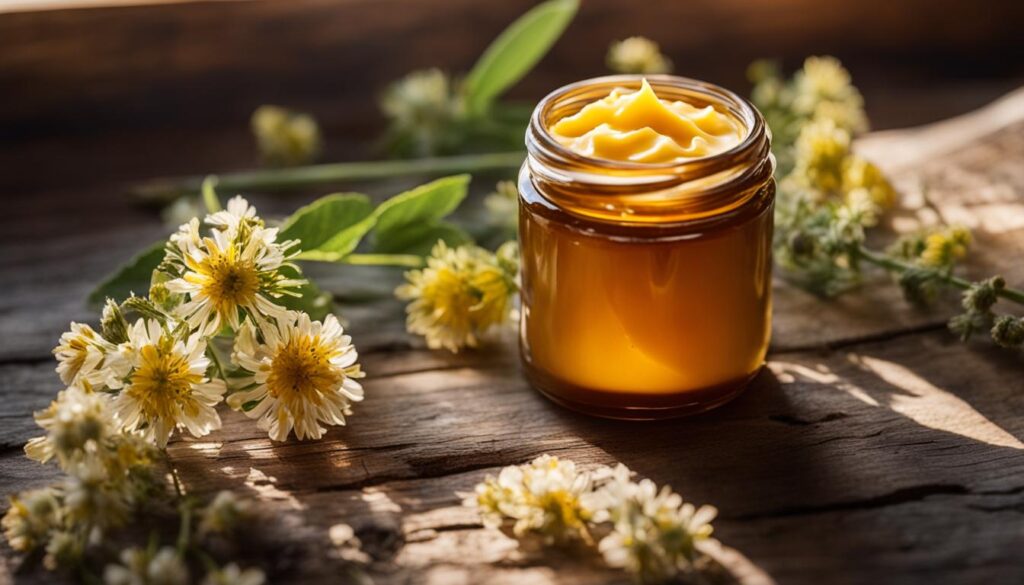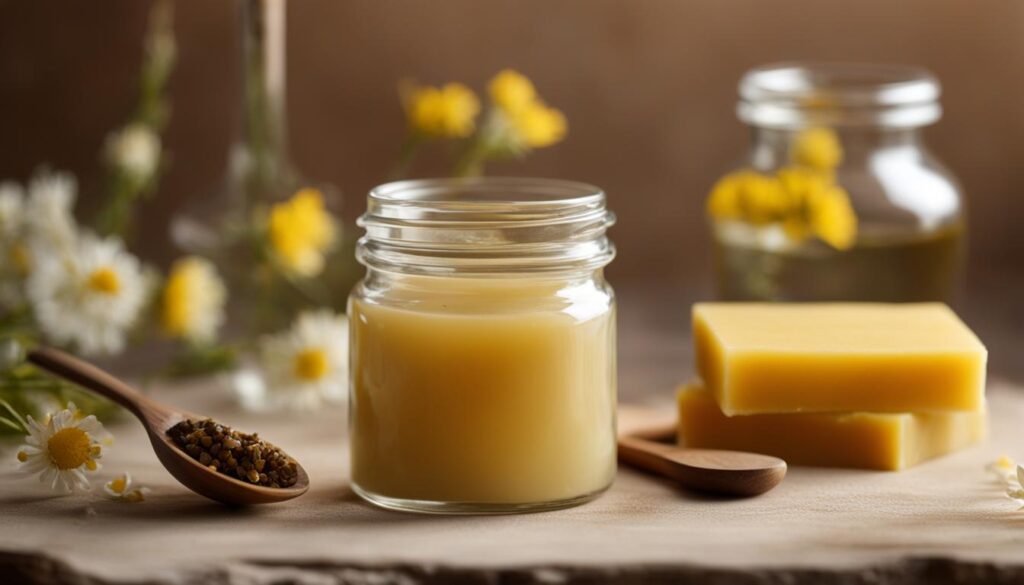Mineral oil and beeswax are two natural ingredients that offer numerous benefits for skincare. They can effectively moisturize and soften the skin, improve the skin barrier function, and lock in moisture. Both mineral oil and beeswax are particularly beneficial for those with dry, sensitive skin or conditions like eczema or psoriasis. While mineral oil can be occlusive and should be used with caution for acne-prone skin, it is generally safe and well-tolerated. These ingredients are commonly found in moisturizers, body creams, and ointments, making them easily accessible for skincare routines.
Key Takeaways:
- Mineral oil and beeswax offer numerous benefits for skincare, including moisturization and improved skin barrier function.
- They are particularly beneficial for those with dry, sensitive skin or conditions like eczema or psoriasis.
- Mineral oil should be used with caution for acne-prone skin due to its occlusive nature.
- Both mineral oil and beeswax can be found in various skincare products, making them easily accessible.
- Consider alternative natural oils for skincare if you prefer to explore other options.
The Moisturizing Power of Mineral Oil
Mineral oil is a powerful moisturizer that can effectively hydrate and nourish the skin. It has the ability to create a protective barrier on the skin’s surface, preventing moisture loss and keeping the skin soft and smooth. Studies have shown that mineral oil can reduce trans-epidermal water loss (TEWL), improving the overall hydration of the skin. This makes it particularly beneficial for those with dry skin or conditions like eczema or psoriasis.
When applied to the skin, mineral oil forms a thin film that traps moisture and prevents it from evaporating. This lock-in effect helps to replenish and maintain hydration levels, leaving the skin moisturized for longer periods. Mineral oil is commonly found in moisturizers, body creams, and ointments, making it easily accessible for incorporating into your daily skincare routine.
The Benefits of Mineral Oil for Dry Skin
One of the key advantages of mineral oil is its ability to deeply moisturize dry skin. By creating a protective barrier, mineral oil helps to seal in moisture, preventing dryness and flakiness. It can also soothe and relieve itchiness caused by dryness, providing much-needed comfort for those with dry or sensitive skin. Additionally, mineral oil can help to improve the texture and appearance of the skin, making it look smoother and more supple.
The Nourishing Benefits of Beeswax
Beeswax is a natural wax secreted by bees and has been used in skincare for centuries. Its moisturizing and emollient properties make it a valuable ingredient for nourishing the skin. Beeswax helps to seal in moisture, soothe dry and cracked skin, and create a protective barrier against environmental toxins. It has also been found to reduce inflammation and provide hydration, making it effective in relieving conditions like diaper rash, eczema, and psoriasis.
One of the key benefits of beeswax is its ability to act as a humectant, attracting and retaining moisture in the skin. This makes it particularly beneficial for those with dry skin or areas of the body prone to dryness, such as the lips, elbows, and heels. Beeswax can also help to soften and smooth the skin, giving it a more supple and youthful appearance.
Another advantage of beeswax is its versatility in skincare products. It is commonly found in lip balms, facial moisturizers, hair treatments, and diaper creams. Its nourishing effects make it a popular ingredient in these products, providing hydration and protection to the skin. Beeswax can also be used on its own or combined with other natural ingredients to create homemade skincare remedies.
The Benefits of Beeswax for Skincare:
- Seals in moisture and prevents dehydration
- Soothes dry and cracked skin
- Creates a protective barrier against environmental toxins
- Reduces inflammation and provides hydration
- Acts as a humectant to attract and retain moisture
- Softens and smooths the skin
With its nourishing properties and wide range of uses, beeswax is a valuable natural ingredient for skincare. Whether it’s in commercial products or homemade remedies, incorporating beeswax into your skincare routine can help to improve the overall health and appearance of your skin.
Natural Skincare Ingredients Comparison
| Ingredient | Moisturizing Properties | Protective Benefits | Soothing Effects |
|---|---|---|---|
| Beeswax | ✓ | ✓ | ✓ |
| Mineral Oil | ✓ | ✓ | ✕ |
| Coconut Oil | ✓ | ✕ | ✓ |
| Shea Butter | ✓ | ✕ | ✓ |
Table: Comparison of moisturizing, protective, and soothing properties of natural skincare ingredients.

The Different Uses of Mineral Oil and Beeswax
Mineral oil and beeswax offer a wide range of uses in skincare, making them versatile ingredients for various purposes. Here are some of the common uses of mineral oil and beeswax:
- Moisturizer: Both mineral oil and beeswax can be used as moisturizers to hydrate and soften the skin. Mineral oil forms a protective barrier that locks in moisture, while beeswax provides a nourishing and emollient effect.
- Protective Barrier: Mineral oil and beeswax have occlusive properties that help protect the skin from external factors like wind, pollution, and harsh weather conditions. They create a barrier that prevents water loss and shields the skin from environmental toxins.
- Relief for Skin Conditions: Mineral oil and beeswax can be beneficial for addressing skin conditions like eczema, psoriasis, and diaper rash. They help soothe inflammation, reduce itching, and provide hydration to alleviate discomfort.
- Ingredient in Homemade Remedies: Beeswax is commonly used in DIY skincare products like lip balms, hand creams, and skin salves. Its natural properties make it an excellent base for creating nourishing and protective formulations.
These are just a few examples of how mineral oil and beeswax can be used in skincare. Their effectiveness and versatility make them popular ingredients in many commercial skincare products, as well as in homemade remedies. Whether you’re looking for moisturization, protection, or relief from specific skin conditions, mineral oil and beeswax offer flexible options for your skincare needs.
| Mineral Oil | Beeswax |
|---|---|
| Moisturizes and softens the skin | Creates a protective barrier against environmental toxins |
| Improves the skin barrier function | Relieves dry and cracked skin |
| Locks in moisture and prevents water loss | Reduces inflammation and soothes skin conditions |
| Can be used for dry, sensitive, and eczema-prone skin | Provides hydration and nourishment |
How to Use Mineral Oil and Beeswax for Skincare
Mineral oil and beeswax can be used effectively in your skincare routine to give your skin the nourishment and protection it needs. Here are some tips on how to incorporate these natural ingredients into your daily skincare regimen:
1. Using Mineral Oil:
To use mineral oil, start by cleansing your skin to remove dirt and impurities. Pat your skin dry, leaving it slightly damp. This will help the mineral oil to penetrate better and lock in moisture. Apply a small amount of mineral oil to your fingertips and gently massage it onto your face and body in circular motions. Focus on areas that are prone to dryness or irritation. Allow the oil to absorb into your skin before applying any other products. Mineral oil can be used once or twice daily, depending on your skin’s needs.
2. Incorporating Beeswax:
Beeswax can be used in various ways to benefit your skin. You can apply it directly to your skin as a nourishing balm or use it as an ingredient in homemade skincare products. To create a homemade hand cream, lip balm, or skin salve, melt beeswax with other natural oils like coconut oil or shea butter. Once melted, let it cool and solidify before applying it to your skin. Beeswax can also be mixed with essential oils for added aromatherapy benefits. Remember to perform a patch test before applying beeswax to broken or inflamed skin.
3. Tips for Both Ingredients:
When using mineral oil and beeswax for skincare, keep the following tips in mind:
- Store your mineral oil and beeswax products in a cool, dry place to maintain their effectiveness.
- If you have acne-prone skin, be cautious with pore-clogging ingredients and consider using mineral oil and beeswax in moderation.
- Always follow the instructions provided with your skincare products and consult with a healthcare professional if you have any concerns.
By incorporating mineral oil and beeswax into your skincare routine, you can enjoy the benefits of these natural ingredients for moisturized, nourished, and protected skin.

Considerations and Side Effects
While mineral oil and beeswax offer numerous benefits for skincare, it is important to be aware of some considerations and potential side effects. Mineral oil, while generally safe and well-tolerated, can potentially clog pores, especially when combined with other pore-clogging ingredients. This makes it less suitable for acne-prone skin. Beeswax, on the other hand, is safe for most individuals but may cause irritation in those with sensitive skin. It is always recommended to perform a patch test before using beeswax on broken or inflamed skin.
It is worth noting that the term “clean” in skincare formulations is not regulated, and certain retailers may not consider mineral oil to be a “clean” beauty product. It is important to do your own research and decide what ingredients align with your personal preferences and skincare goals.
When using mineral oil and beeswax for skincare, it is crucial to follow instructions and consult with a healthcare professional if you have any concerns. Proper storage and usage are also key to ensuring their effectiveness and safety. Mineral oil should be stored in a cool, dry place to prevent melting, and it should be used within two hours of mealtime to avoid interference with vitamin absorption. Inhalation of mineral oil can cause pneumonia, so care should be taken to avoid inhaling it. People with swallowing problems or pre-existing respiratory conditions should avoid oral use of mineral oil.
Overall, while mineral oil and beeswax can be beneficial for skincare, it is important to consider individual skin types and potential sensitivities. By being aware of these considerations and following proper usage guidelines, you can safely incorporate mineral oil and beeswax into your skincare routine to achieve healthy and nourished skin.
Other Natural Options for Skincare
If you’re looking for natural alternatives to mineral oil and beeswax for your skincare routine, there are several options available. These natural oils can provide similar benefits and nourishment to the skin without the use of mineral oil or beeswax.
1. Castor Oil:
Castor oil is a versatile oil that is rich in fatty acids and has moisturizing properties. It can help soothe dry and irritated skin, promote skin healing, and reduce inflammation. Castor oil is often used in facial oils, body lotions, and hair care products due to its hydrating and nourishing effects.
2. Olive Oil:
Olive oil is a popular natural oil that is rich in antioxidants and vitamins. It has moisturizing properties that can help keep the skin hydrated and reduce dryness. Olive oil can also act as a gentle cleanser and makeup remover. It is often used in facial cleansers, moisturizers, and body oils for its nourishing and soothing effects.
3. Coconut Oil:
Coconut oil is a widely used natural oil known for its moisturizing properties. It can help retain moisture in the skin, leaving it soft and supple. Coconut oil can also soothe skin conditions like eczema and psoriasis, thanks to its antimicrobial and anti-inflammatory properties. It is commonly found in body butters, lip balms, and hair care products.
Incorporating these natural oils into your skincare routine can provide you with a range of benefits without the use of mineral oil or beeswax. However, it’s essential to consider your skin type and any potential allergies or sensitivities before trying new products. Always perform a patch test and consult with a dermatologist if you have any concerns.
The Importance of Proper Storage and Usage
Proper storage and usage of mineral oil and beeswax are crucial for ensuring their effectiveness and safety. By following these guidelines, you can maximize the benefits of these natural skincare ingredients:
- Store mineral oil in a cool, dry place: To prevent melting or spoilage, it’s essential to store mineral oil in a cool and dry environment. Avoid exposing it to direct sunlight or high temperatures.
- Use mineral oil away from mealtime: Mineral oil can interfere with the absorption of vitamins and nutrients. To avoid any potential interactions, it is recommended to use mineral oil at least two hours before or after a meal.
- Avoid inhalation of mineral oil: Inhalation of mineral oil can lead to aspiration pneumonia, a condition that causes inflammation in the lungs. Take precautions to prevent inhalation, especially when applying mineral oil to the face or using it in a mist form.
- Exercise caution during pregnancy: It’s important to consult with a healthcare professional before using mineral oil during pregnancy. High doses of mineral oil during pregnancy may increase the risk of hemorrhagic disease in newborns.
- Perform patch tests for beeswax: Beeswax is generally safe for most individuals, but it may cause irritation in people with sensitive skin. Before applying beeswax to broken or inflamed skin, conduct a patch test to ensure tolerance and avoid potential adverse reactions.
- Avoid oral use of mineral oil with certain conditions: If you have swallowing difficulties or preexisting respiratory conditions, it is advisable to avoid ingesting mineral oil orally. Speak with your healthcare provider for appropriate alternatives or guidance.
By properly storing and using mineral oil and beeswax, you can enjoy the benefits of these natural ingredients while minimizing any risks or potential side effects. It’s always recommended to consult with a healthcare professional or dermatologist if you have any specific concerns or questions regarding their usage.
Table: Do’s and Don’ts for Mineral Oil and Beeswax Storage and Usage
| Do’s | Don’ts |
|---|---|
| Store mineral oil in a cool, dry place. | Expose mineral oil to direct sunlight or high temperatures. |
| Use mineral oil at least two hours away from mealtime. | Inhale mineral oil during application. |
| Consult with a healthcare professional during pregnancy. | Use high doses of mineral oil during pregnancy. |
| Perform patch tests for beeswax on sensitive or broken skin. | Apply beeswax directly to broken or inflamed skin without patch testing. |
| Seek alternative options for oral use if you have swallowing difficulties or respiratory conditions. | Ingest mineral oil orally with swallowing difficulties or respiratory conditions. |
Conclusion
In conclusion, mineral oil and beeswax are natural ingredients that offer a multitude of benefits for skincare. Their moisturizing and nourishing properties make them ideal for those with dry, sensitive skin or conditions like eczema and psoriasis. Mineral oil effectively seals in moisture and protects the skin, while beeswax creates a protective barrier and soothes dry and cracked skin.
Both mineral oil and beeswax can be easily incorporated into skincare routines through commercial products or homemade remedies. Whether you choose to use them individually or together, they provide a natural and accessible solution for achieving healthy and nourished skin.
While mineral oil and beeswax are generally safe for use, it’s important to consider individual skin types and potential sensitivities. Always perform a patch test before use and consult with a healthcare professional if you have any concerns. Overall, mineral oil and beeswax offer a natural and effective option for those seeking to enhance their skincare routine.
FAQ
What are the benefits of mineral oil and beeswax for skincare?
Mineral oil and beeswax can effectively moisturize and soften the skin, improve the skin barrier function, and lock in moisture. They are beneficial for dry, sensitive skin and conditions like eczema or psoriasis.
Can mineral oil be used for acne-prone skin?
While mineral oil can be occlusive and potentially pore-clogging, it is generally safe and well-tolerated. However, caution should be exercised for acne-prone skin.
What are the uses of mineral oil and beeswax in skincare?
Mineral oil is commonly found in moisturizers, body creams, and ointments. Beeswax is often used in lip balms, facial moisturizers, hair treatments, and diaper creams.
How should mineral oil and beeswax be used in skincare?
Mineral oil can be applied to slightly damp skin after showering to lock in moisture. It can be used once or twice daily. Beeswax can be applied directly to the skin or combined with other ingredients to create homemade skincare products.
Are there any considerations or side effects of using mineral oil and beeswax?
Mineral oil may potentially clog pores, especially when combined with pore-clogging ingredients. Beeswax is generally safe but may cause irritation in those with sensitive skin. Always perform a patch test before using beeswax on broken or inflamed skin.
Are there alternatives to mineral oil and beeswax for skincare?
Yes, alternative natural oils such as castor oil, olive oil, coconut oil, grapeseed oil, and avocado oil can provide similar benefits for the skin.
What is the importance of proper storage and usage of mineral oil and beeswax?
Mineral oil should be stored in a cool, dry place to prevent melting. It should be used within two hours of mealtime to avoid interference with vitamin absorption. Care should be taken to avoid inhalation of mineral oil.




